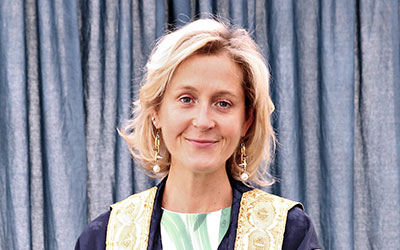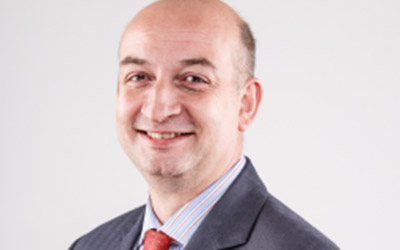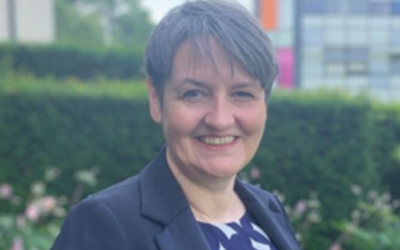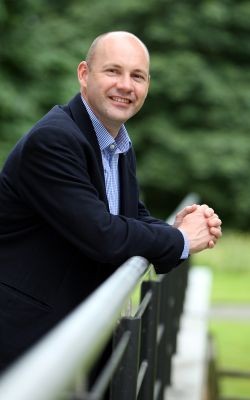University officers
The Officers of the University are key figures within the OU, whose roles and responsibilities together with details of their respective appointments are identified in the Charter (pdf 305kb).
The External Officers of the University, namely, the Chancellor, the Pro-Chancellor and the Treasurer, should not be confused with the (Vice-Chancellor’s Executive) who run the University on a day-to-day basis.
External Officers

The Chancellor of the University
The Chancellor is the most senior officer of the University, but is not a member of staff and plays no direct part in the day-to-day running of the institution. As the ceremonial head of the University, the Chancellor's main formal role is to preside at degree ceremonies. The Chancellor acts as an ambassador for the University, promoting its interests, and participates in the key events that mark the life of the University.
The Chancellor is appointed by a joint meeting of the Council and the Senate.
The Chancellor of The Open University is Baroness Lane-Fox.

The Pro-Chancellor of the University (and Chair of Council)
The primary role of the Pro-Chancellor is as Chair of the Council. As Chair, the Pro-Chancellor is responsible for the leadership of the governing body and for ensuring that it deals with its business efficiently and effectively, in a manner appropriate to the proper conduct of public business, and in accordance with the University’s Charter and Statutes and with the University’s internal rules and regulations. The Pro-Chancellor is an external member of the Council, not a member of the University staff.
The Pro-Chancellor also chairs a number of other University committees, namely the Governance and Nominations Committee, and is a member of the Remuneration Committee, Strategic Planning and Resources Committee and Finance Committee.
The Pro-Chancellor occasionally takes the role of Chief Presiding Officer at the University’s degree ceremonies and attends other high profile events on behalf of the University. He/she acts as an ambassador or representative of the OU to lobby and network on its behalf. The Pro-Chancellor is also a source of advice for the Vice-Chancellor on strategic and policy issues.
The Pro-Chancellor of The Open University is Malcolm Sweeting
(term of office: to 31 December 2026).

The Treasurer
The Treasurer is a key member of the Council and Chair of the Finance Committee. The Treasurer is not a member of staff, but works with the University’s Finance Director to ensure that the financial position of the University and other financial issues are presented to the Finance Committee, and then to the Council, in an appropriate and timely manner. He/she identifies and raises issues pertinent to the remit of the Council, and the policies of the University, and contributes to the work and decision making process of the Council through discussion, advice and guidance.
The Treasurer is also a member of the Strategic Planning and Resources Committee and the Remuneration Committee.
The Treasurer is appointed by the Council.
The Treasurer is Mr Robert Mccracken
(term of office: to 31 July 2027)
Internal Officers

The Vice-Chancellor
The Vice-Chancellor is the chief academic and administrative officer of the University, with responsibility for maintaining and promoting the integrity of the University's degree, diploma and certificate offerings, as well as the efficiency and good order of the University in general. They lead the institution on a day-to-day basis, chairs senior University committees and takes overall responsibility for all strategy and operations of the University, within broad policies laid down by the Council and in accordance with funding council requirements.
The Vice-Chancellor’s Annual Report to the Council accounts for the University’s planning, receipt, and allocation of resources and development activity each year. They delegate responsibility for the management of key areas of activity to members of the executive team as shown in the Open University Organisational Structure and OU Administrative Substructure charts. They are appointed by the Council following consideration of a recommendation from a joint committee of the Council and the Senate.
The Vice-Chancellor is Professor David Phoenix
(term of office: from 1 July 2025).

The Deputy Vice-Chancellor
Reporting to the Vice-Chancellor and serving as a member of the Vice-Chancellor’s Executive, the Deputy Vice-Chancellor provides oversight and leadership on behalf of the Vice-Chancellor, to the academic domain of the University. The role provides significant support in developing and delivering the University's academic strategy and provides visible corporate leadership on issues assigned and agreed by the Vice-Chancellor. The Deputy Vice-Chancellor deputises for the Vice-Chancellor as appropriate.
In addition, the role chairs the VCE-Academic (whose members are the two Pro-Vice-Chancellors, the four Executive Deans and the Director of Academic Services) and is responsible for leading its shape and development as an effective and accountable coordinator group. The role also ensures the effectiveness and appropriateness of pedagogy such that curriculum, tuition and student experience are fully integrated and applied consistently across the institution.
The Deputy Vice-Chancellor is Professor Josie Fraser
(term of office: from 1 January 2019)
2.jpg)
Pro-Vice-Chancellor Students
The PVC Students portfolio has been designed to ensure that the needs and concerns of all students are represented at the most senior level of the University and shared and addressed throughout the University. In addition to the Student Success Priorities (Supported Open Entry, Flexible Study Intensity and Communications to Continuing Students), PVC Students has responsibility for Employability, Student Satisfaction, Teaching Excellence Framework (TEF), Widening Access and Success (WAS), Quality Monitoring and Enhancement (QME) and Quality Assurance (QA). The portfolio works very closely with OUSA on Student Voice and Student Engagement.
The Pro-Vice-Chancellor Students is Professor Ian Pickup.
(term of office: from 3 April 2023).

Interim Pro-Vice-Chancellor (Research & Innovation)
Professor Mark Brandon is the Interim Pro-Vice-Chancellor for Research and Innovation with senior responsibility for strategic leadership and implementation of the institutional plans for research, knowledge exchange and scholarship.
The Research, Enterprise & Scholarship (RES) Unit facilitates the University's excellence in research, enterprise, scholarship and external engagement as well as to provide expert strategic and support services across these activities.
It works in support of Faculties, Schools and Institutes, as well as with a wide range of external partners, collaborators and funders.
It is responsible for the University’s submissions to the UK-wide Research Excellence Framework (REF) and our institutional approach to knowledge exchange and expansion of entrepreneurial activities..
(Mark's term of office from 11 August 2025)
.jpg)
The University Secretary
The University Secretary is also a member of the executive team and is responsible for the overall direction and coordination of the University’s professional and support services. They also have overall responsibility for University governance and is Secretary of the Senate and the Council.
The Council appoints the University Secretary following consideration of a recommendation from a joint committee of the Council and the Senate.
The University Secretary is Dave Hall.